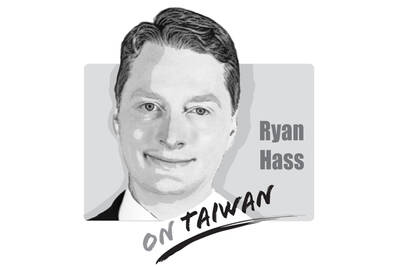For obvious reasons, all eyes have been on the Control Yuan’s review of the government’s response to Typhoon Morakot. Soon after the typhoon hit Taiwan and the devastation in the south became apparent, Control Yuan President Wang Chien-shien (王建煊) reacted to the government’s incompetent response with the classic line: “I was so angry that I wanted to scold and kill people, but I didn’t know who to blame.”
President Ma Ying-jeou (馬英九) did, however. His first public criticism was directed at the Central Weather Bureau (CWB). Someone or something had to be immediately accountable, and the easiest target was a bunch of civil-service meteorologists with no opportunity to defend their organization or their individual professionalism.
Wang, meanwhile, was able to compose himself and be more specific: “The Control Yuan will impeach the heads of government institutions who failed to improve the problems highlighted by the Control Yuan’s corrective measures.”
And this: “The Control Yuan is entitled to impeach heads of government agencies repeatedly until they step down, and to keep impeaching their successors until problems are resolved.”
Fine words, but judging from the Control Yuan report on the CWB’s handling of Morakot this week, it is not certain that those who acted negligently or incompetently will be identified. Worse, it is possible that scapegoating will be an acceptable substitute.
Try as it might, the Control Yuan report made no meaningful comment on professional aspects of weather forecasting — in particular, how to determine the volume of rainfall likely to hit specific locations that might lead to fatalities. The CWB cannot be held to account for natural phenomena for which no scientific technique offers reliable predictive assistance. Besides, the CWB is made up of meteorologists, not geologists — and certainly not soothsayers.
The Control Yuan’s corrective measures in some cases were laughable, including the quaint idea of a drain-cleaning reminder service for those who need such advice. Clearly, its investigators must adopt a more intelligent approach.
At a press conference on Wednesday, Control Yuan member Cheng Jen-hung (程仁宏) actually offered praise to CWB staff for their meteorological aptitude, but said they have poor public relations skills.
Cheng, who rode into the Control Yuan on the back of his leadership of the Consumers’ Foundation — a media-savvy organization that conducts unscientific “surveys” of consumer products and issues doom-ridden press releases — has, for one, carried over his hobby-horse approach to government accountability by focusing on insubstantial matters. No one should be surprised by this; Cheng, after all, once warned that the High Speed Rail was at risk of derailing, but we still don’t know why.
If an official culture of excessive blame and activist meddling continues, what public confidence that remains in the Control Yuan will sour and political influence could act as the casting vote where profitable.
Premier Wu Den-yih (吳敦義) may have detected the danger in this, not to mention the gross injustice. On Thursday last week, he made special mention of Daniel Wu (吳德榮), a senior forecaster and head of the CWB’s forecast center who retired early after its pitiful treatment at the hands of the president.
The premier said: “Launching attacks on civil servants who are faithful to their duties and perform well, sapping their morale, will negatively influence the growth of society and impede the nation’s progress. Civil servants should be appraised justly.”
Hear, hear. If only the Control Yuan, and the president, understood why.

There has been much catastrophizing in Taiwan recently about America becoming more unreliable as a bulwark against Chinese pressure. Some of this has been sparked by debates in Washington about whether the United States should defend Taiwan in event of conflict. There also were understandable anxieties about whether President Trump would sacrifice Taiwan’s interests for a trade deal when he sat down with President Xi (習近平) in late October. On top of that, Taiwan’s opposition political leaders have sought to score political points by attacking the Lai (賴清德) administration for mishandling relations with the United States. Part of this budding anxiety
The diplomatic dispute between China and Japan over Japanese Prime Minister Sanae Takaichi’s comments in the Japanese Diet continues to escalate. In a letter to UN Secretary-General Antonio Guterres, China’s UN Ambassador Fu Cong (傅聰) wrote that, “if Japan dares to attempt an armed intervention in the cross-Strait situation, it would be an act of aggression.” There was no indication that Fu was aware of the irony implicit in the complaint. Until this point, Beijing had limited its remonstrations to diplomatic summonses and weaponization of economic levers, such as banning Japanese seafood imports, discouraging Chinese from traveling to Japan or issuing
On Nov. 8, newly elected Chinese Nationalist Party (KMT) Chairwoman Cheng Li-wun (鄭麗文) and Vice Chairman Chi Lin-len (季麟連) attended a memorial for White Terror era victims, during which convicted Chinese Communist Party (CCP) spies such as Wu Shi (吳石) were also honored. Cheng’s participation in the ceremony, which she said was part of her efforts to promote cross-strait reconciliation, has trapped herself and her party into the KMT’s dark past, and risks putting the party back on its old disastrous road. Wu, a lieutenant general who was the Ministry of National Defense’s deputy chief of the general staff, was recruited
The Food and Drug Administration (FDA) on Nov. 5 recalled more than 150,000 eggs found to contain three times the legal limit of the pesticide metabolite fipronil-sulfone. Nearly half of the 1,169 affected egg cartons, which had been distributed across 10 districts, had already been sold. Using the new traceability system, officials quickly urged the public to avoid consuming eggs with the traceability code “I47045,” while the remainder were successfully recalled. Changhua County’s Wenya Farm — the source of the tainted eggs — was fined NT$120,000, and the Ministry of Agriculture instructed the county’s Animal Disease Control Center to require that